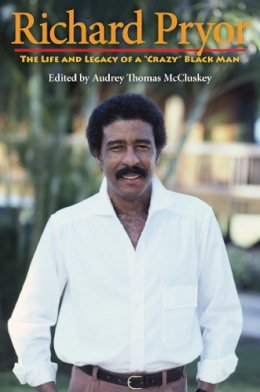Audrey Thomas McCluskey is a professor of African American and African diaspora studies and former director of the Black Film Center/Archive at Indiana University, Bloomington. She lives in Bloomington, Indiana.
"Pryor (1940-2005) was arguably one of the most influential American comedians of the 20th century. This collection attempts to give him his due by considering the ways in which he influenced not only comedy but also US television and entertainment as political statement. Divided into four sections—"New Essays,"Biography,"Reviews," and "Social and Cultural Criticism"—the essays vary in length and quality. McCluskey (Indiana Univ.) is the most significant contributor. Her analysis of Pryor as both comic genius and tortured soul, description of the censorship of his influential 1977 television series, and interview with frequent Pryor director Michael Schultz illustrate her fine writing and understanding of the importance of this seminal figure. But Pauline Kael's reviews of Pryor's films are a misstep and make one question her place in the pantheon of film criticism. This reviewer also wishes McClusky had provided a more in-depth analysis of Pryor's movies, particularly the blockbusters he made with Gene Wilder. These shortcomings aside, McClusky's contributions and other essays, specifically those by David Felton and Keith Harris, invite discussion on the ways Pryor transformed American comic style. Summing Up: Recommended. Upper-division undergraduates through faculty. —Choice"—G. R. Butters Jr., Aurora University, March 2009 "McClusky's contributions and other essays, specifically those by David Felton and Keith Harris, invite discussion on the ways Pryor transformed American comic style. . . . Recommended.March 2009"—Choice "McClusky's Life & Legacy Of . . . gathers together 20 essays and features on Pryor, ranging from retrospective cultural criticism, contemporary reviews and interviews and biographical features. Each tries to pinpoint exactly what made Pryor so important. . . March 2009"—Record Collector ". . . presents a variety of new and historical perspectives from scholars, filmmakers, and writers that yield insight into the comedian's origins, how he negotiated the difficult straits of the entertainment business, and what his work ultimately signified. . . . February/March 2009"—Bloom "[Like] Charlie Parker, Miles Davis, Marvin Gaye, [and] Muhammad Ali . . . Richard Pryor contributed the combination of brilliance and tragedy at the core of what it means to be a Black man in America. Like the best jazz improvisers on the bandstand, [Pryor] turned life's mundane moments into intellectual property of the highest order and made life's most difficult situations seem like the proverbial drop in the bucket."—Todd Boyd, author of Am I Black Enough for You?

